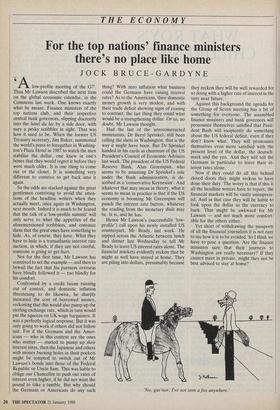THE ECONOMY
For the top nations' finance ministers there's no place like home
JOCK BRUCE-GARDYNE
Alow-profile meeting of the 07'. Thus Mr Lawson described the next item on the global economic calendar, in the Commons last week. One knows exactly what he meant. Finance ministers of the top nations club, and their respective central bank governors, slipping discreetly into the hotel du lac by a side door, with nary a pesky scribbler in sight. That was how it used to be. When the former US Treasury secretary, Jim Baker, summoned the world's press to foregather in Washing- ton's. Plaza Hotel in 1987 to watch the men stabilise the dollar, one knew in one's bones that they would regret it before they were much older. It is one thing to come out ot the closet. It is something very different to contrive to get back into it again.
So the odds are stacked against the great gentlemen contriving to avoid the atten- tions of the headline writers when they actually meet, once again in Washington, next month. Indeed it is much to be feared that the talk of a low-profile summit' will only serve to whet the appetites of the aforementioned scribblers, and convince them that the great ones have Something to hide. As, of course, they have. What they have to hide is a transatlantic interest rate auction, in which, if they are not careful, someone is going to get hurt.
Not for the first time, Mr Lawson has contrived to set the example — and then to bewail the fact that his partners overseas have blindly followed it — too blindly for his comfort.
Confronted by a credit boom running Out of control, and domestic inflation threatening to do likewise, he sharply increased the cost of borrowed money, reckoning that this would also pump up the sterling exchange rate, which in turn would put the squeeze on UK wage bargainers. It was a perfectly logical response. But it was only going to work if others did not follow suit. For if the Germans and the Amer- icans — who in this context are the ones who matter — started to pump up their interest rates, then the Japanese and others with money burning holes in their pockets might be tempted to switch out of Mr Lawson's bonds into those of the Federal Republic or Uncle Sam. This was liable to oblige our Chancellor to push our rates of interest even higher, if he did nor want the pound to take a tumble. But why should the Germans or Americans do any such thing? With zero inflation what business could the Germans have raising interest rates? As to the Americans, their domestic money growth is very modest, and with their trade deficit showing signs of ceasing to contract, the last thing they could want would be a strengthening dollar. Or so, no doubt, Mr Lawson thought.
Had the last of the unreconstructed monetarists, Dr Beryl Sprinkel, still been calling the shots in Washington, that is the way it might have been. But Dr Sprinkel handed in his cards as chairman of the US President's Council of Economic Advisers last week. The president of the US Federal Reserve Bank, Alan Greenspan, who seems to be assuming Dr Sprinkel's role under the Bush administration, is de- scribed as a 'conservative Keynesian'. And whatever that May mean in theory, what it seems to mean in practice is that if the US economy is booming Mr Greenspan will punch the interest rate button, whatever the reading from the monetary dials may be. It is, and he has.
Hence Mr Lawson's (successfully low- profile') call upon his newly installed US counterpart, Mr Brady, last week. He nipped across the Atlantic between lunch and dinner last Wednesday to tell Mr Brady to leave US interest rates alone. The financial markets evidently reckon that he might as well have stayed at home. They are piling into dollars, presumably because they reckon they will be well rewarded for so doing with a higher rate of interest in the very near future.
Against this background the agenda for the Group of Seven meeting has a bit of something for everyone. The assembled finance ministers and bank governors will pronounce themselves satisfied that Presi- dent Bush will incipiently do something about the US federal deficit, even if they don't know what. They will pronounce themselves even more satisfied with the present level of the dollar, the deutsch- mark and the yen. And they will tell the Germans in particular to leave their in- terest rates alone.
Now if they could do all this behind closed doors they might reckon to have done their duty. The worry is that if this is all the headline writers have to report, the financial markets will be vastly unimpress- ed. And in that case they will be liable to look upon the dollar as the currency to back. That might be awkward for Mr Lawson — and not nrtuch more comfort- able for the others either.
Yet short of withdrawing the passports of all the financial journalists it is not easy to see how it is to be avoided. So I think we have to pose a question. Are the finance ministers sure that their journeys to Washington are really necessary? If they cannot meet in private, might they not be best advised to stay at home?
'No, guv'nor, I've not seen a fox anywhere.'


























































 Previous page
Previous page